An Indian Summer In Paris
The 2024 Olympics promise to be a watershed in the country’s sporting history
 Boria Majumdar
Boria Majumdar
 Boria Majumdar
Boria Majumdar
 |
22 Mar, 2024
|
22 Mar, 2024
/wp-content/uploads/2024/03/Paris1.jpg)
Abhinav Bindra and Sourav Ganguly at the Revsportz Trailblazers Conclave 2.0 in Kolkata, March 7-8, 2024
FOR FIVE MONTHS we had worked to get India’s best Olympic and Paralympic athletes under one roof for a meaningful dialogue that could enrich the sport ecosystem. The ambition was to make a difference in an Olympic and Paralympic year. With 40 of our best athletes participating in the Revsportz Trailblazers Conclave 2.0 in Kolkata on March 7-8, Mission Impossible had just been accomplished. At its end, Shriyanka Sadangi walked up to me to say goodbye. Shriyanka is one of our best shooters at the moment and has already earned a Paris 2024 quota in the 50m 3-position event.
“I was in two minds about the conclave to start with. I wasn’t sure if I should take a break from the camp for a day and come over. Moreover, after the camp was moved to Bhopal, the connectivity with Kolkata has not been great. Would it actually help? May I tell you that I am hugely pleased with the outcome. I learnt a lot from the sessions and also from the conversations backstage. I had a one-hour conversation with Abhinav [Bindra] and my takeaways from these conversations are immense.
Please hold this conclave every year and get us all together,” she said.
“The most important lesson that sport teaches us is how to lose. I learnt from every loss and it got me closer to success. It has taught me to stay in the present and be the best version of myself,” says Abhinav Bindra, retired shooter and Olympic gold medallist
Sadangi was not alone. Sample this from Anush Agarwalla, who has made history by winning an Olympic quota for India in dressage: “To share the stage with so many legends was in itself an honour. But then to have them there for informal conversations all day made the conclave for me. I spoke to Mahesh Bhupathi, Joshna Chinappa, Mary Kom, and others and asked questions that I normally don’t get to ask. I asked them how they deal with the pressure of expectations. How do they face the media? What is it like to be in the Olympic Games? Everyone trains in their own little cocoon and in India there is rarely an opportunity for people from across sports to come together like this.” Manasi Joshi, Paralympic badminton star, went a step ahead. “We keep hearing about equal treatment. But then you hear something and you see something entirely different. In most conclaves or conferences, there is a token session on Paralympic sport and we feel we have done our job in standing up for equality. Real equality is when we share the stage with able-bodied athletes. When we are treated as equals and not as para athletes. We don’t need sympathy. We aren’t stories and shouldn’t be treated as such. In this conclave every second session had a Paralympic athlete share his or her experiences with able-bodied men and women. You had Neeraj Chopra and you also had Sumit Antil. That’s what stood out for all of us,” said Joshi.
“You train every day till you attain a kind of perfection that makes you ready for the biggest stage. Preparation is the key and if you are the best prepared you will automatically deal with pressure better,” says Sourav Ganguly, retired cricketer and former BCCI president
The conclave was meant to be a disruption. It was meant to table key issues of mental health and women’s health, get the legends to speak up on handling pressure and talk about how to be the best prepared for the Olympics. It was meant to be a toolkit for young athletes who will soon be competing at the highest global stage.
“You don’t wake up one fine day and tell yourself that you are the best prepared for an Olympic Games or a World Cup. The process should be second nature to you. You train every day till you attain a kind of perfection that makes you ready for the biggest stage. Preparation is the key and if you are the best prepared you will automatically deal with pressure better. Your subconscious knows what to do. It knows how to react to situations that may come your way. At the same time, you need to keep things simple. The words World Cup change it all. It is still a game of bat and ball. You still need to score runs or pick up wickets like you have done all your life. I used to tell myself that there was nothing I needed to do differently. Yes, the India-Pakistan match was different. Fan passion was different. Everything around it was different. But for us as players it was still the basic game of cricket that you needed to play and play well. That did not change and that’s what I have said to everyone all my life,” said Sourav Ganguly.

Neeraj Chopra, on the same panel as Ganguly and Bindra, concurred. “I just want to be the best prepared for Paris. If you are the best prepared, you will surely have the best chance. There are a number of athletes who are doing extremely well and the competition will be intense at the Olympics. But all I am concerned with is how well I am prepared. If I am the best prepared that’s all I need to do. Results will come if the process is right,” he said.
“The competition will be intense at the Olympics. But all I am concerned with is how well I am prepared. If I am the best prepared that’s all I need to do. Results will come if the process is right” says Neeraj Chopra
The conclave was not simply about legends. It was also about the athletes who are on their way up and who will be stepping out for India in Paris. It was about giving them an opportunity to interact with stars who know about the Olympics and how to handle pressure.
Satwiksairaj Rankireddy said, “Let me take you back to the night before the Asian Games final. It was one of the most important matches of our careers and both Chirag [Shetty] and I were feeling the tension. So we decided to go to [PR] Sreejeshbhaiya’s room and chat with him. He is a treasure house of stories and is one of the legends of the sport. He has won every competition that there is to win. How he stood up in Tokyo is known to us all. Listening to him made us relax. We could start to focus on the final and won gold for India the next day.”
SPORT HAS ALWAYS LENT ITSELF to great storytelling and each one of the athletes present was a story. To hear Pullela Gopichand talk about his relationship with daughter Gayatri or to hear Nikhat Zareen talk about her mother, now a convert to boxing, inspired everyone.
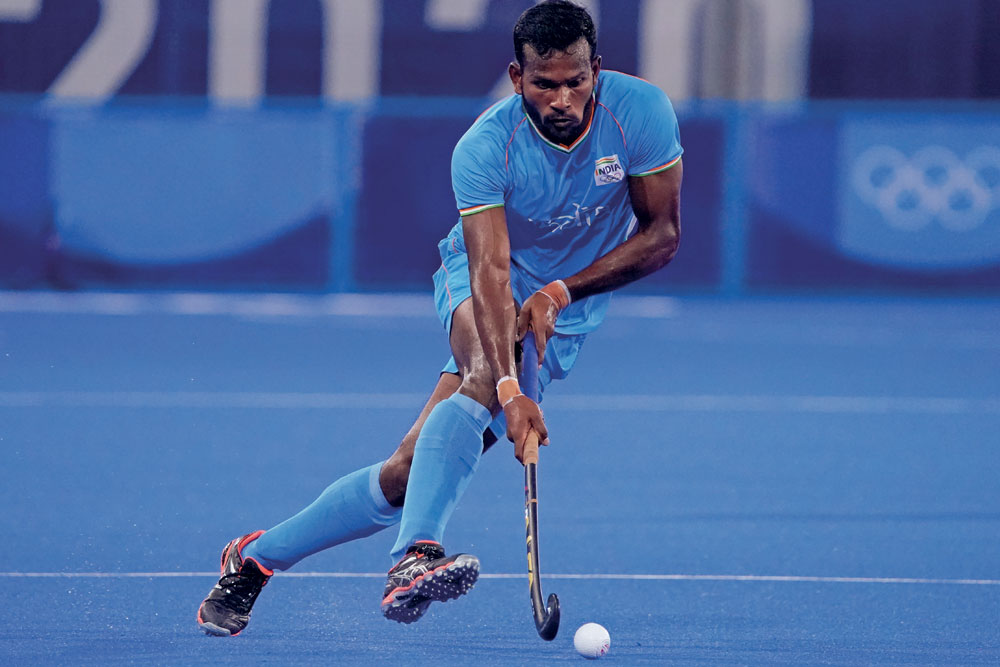
“To have Gopichand Pullela attached to your name is not easy and I know it well. If you see the cases of Abhishek Bachchan, Arjun Tendulkar, Rohan Gavaskar, you will know what I mean. For Gayatri, it was more so because her father is the national head coach. At no point could she walk up to me and ask for individual attention because she was acutely conscious that I had other responsibilities and could never give her separate time. And for me, far more than the coach-student relationship, the father-daughter relationship is special. I did not want to lose my daughter by being her coach. So we were both conscious of the reality,” said Gopi. His last words were telling. “Gayatri is a breath of fresh air for me. A kind of positive energy which I don’t think I will be able to articulate to you. In 2008-09, I used to go to the academy by 4:15AM and by 6:30AM was visibly tired. At that time she would be there. She was five years old and just to see her there gave me renewed energy. It helped me in my work. And then when she started playing I was always conscious about coaching her in a group. That was the best way to help her socialise. Never have I coached her individually,” he said.
“When I rush out to block the ball, all I think of is that I am trying to save a goal for India. At the Olympics we will all do our best. I know how much the country will be wanting us to do so,” says Amit Rohidas, field hockey player
Nikhat Zareen’s story was equally interesting. “When I started boxing, my mother was seriously worried about what it could do to my face. What would happen if I got hurt and disfigured my face! Who would then marry me? Who would marry my sisters, girls who come from a family where one sibling was a boxer? But then things changed when I started to win. When I became world champion, my mother was immensely proud. I remember a day when I had got hit and had a black eye. When my mother spotted it, all she said was, ‘Don’t worry about it, it will be fine in a couple of days.’ That’s what sport can do. She is a changed person,” she said.
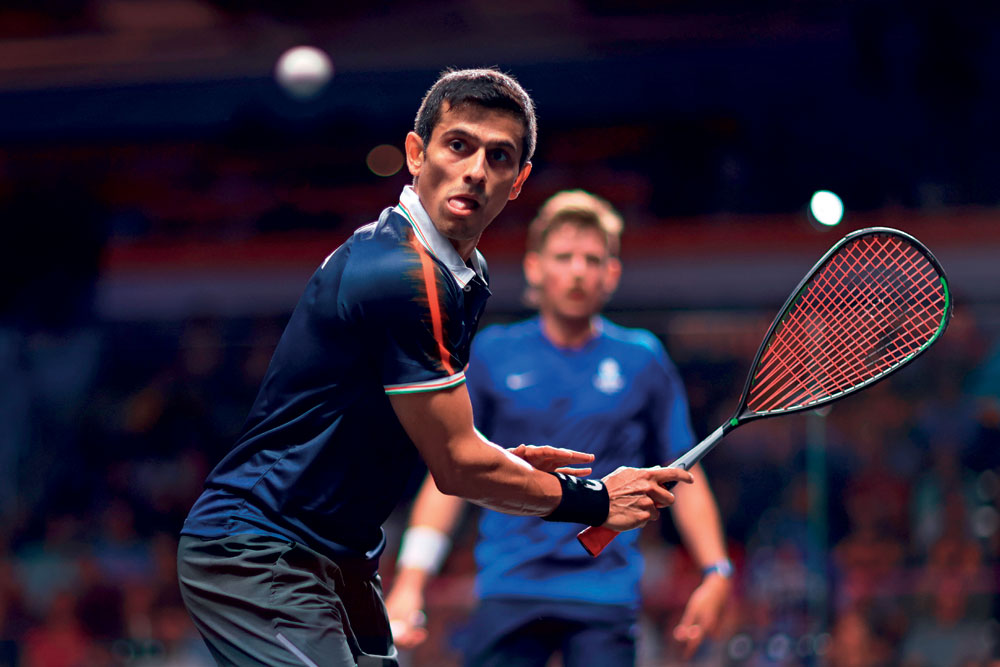
But the best part of the story was yet to come. “My mother now watches every bout of mine. And she is the one who shouts and screams the most. My father tells me that each time I land a punch she screams ‘maar maar aur maar’. You know I can almost sense she is out there with me fighting,” concludes Zareen.
For years, Nikhat was waiting for her chance. With Mary Kom, also a participant in the conclave, fighting in the same weight category, it was difficult for Zareen to break through. “Yes, it was difficult. But then when I did get my opportunity, I was determined not to let it go. I fight every bout as if it is my last. I want to win every competition that there is to win and, needless to say, my ultimate goal is to win an Olympic medal for India,” she said.
“Had it not been for the inclusion of squash in the 2028 Olympics, I would have retired by now. But then the Olympics are what a sportsperson lives for,” says Saurav Ghosal, squash player
IT IS THIS OLYMPIC DREAM THAT fires Amit Rohidas, India’s first rusher and one of the best penalty corner first rushers in the world at the moment. “When you think of saving penalty corners, please take into account that we don’t have all the protective gear that goalkeepers have. You know you can get hit badly and even die. But then that’s the whole charm of playing sport. Of doing something for your country. When I rush out to block the ball, all I think of is that I am trying to save a goal for India. Nothing else comes to mind at the moment and that’s what has made me good at what I do. At the Olympics we will all do our best. I know how much the country will be wanting us to do well and I can assure you that in terms of effort we won’t be found wanting,” said Amit.
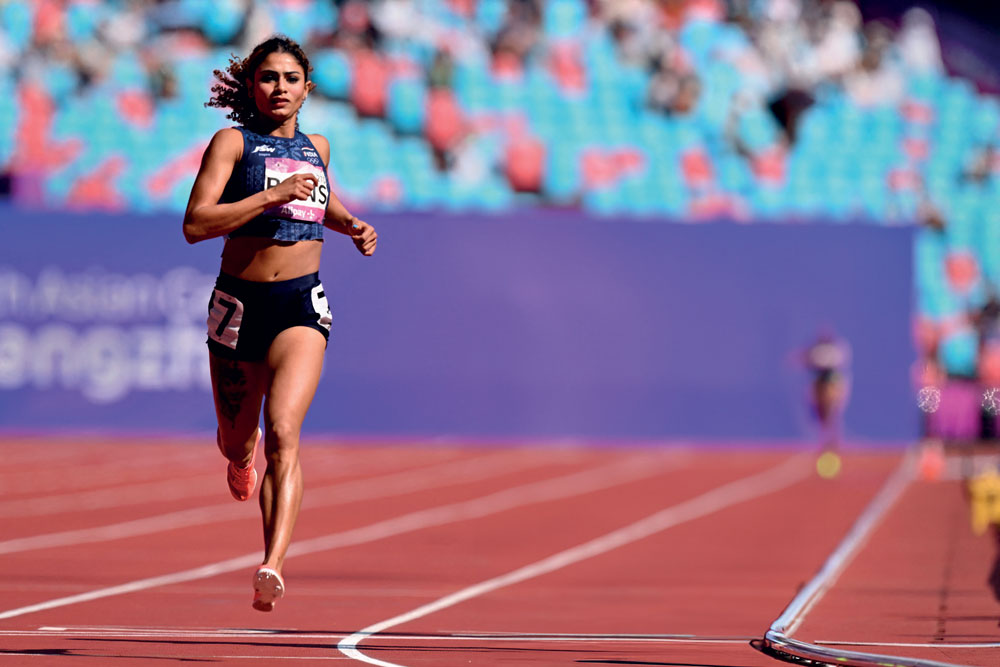
As he was speaking, there was a warm pat on the back. It was Leander Paes, one of India’s greatest ever Olympians and one who broke the jinx of not winning an individual medal for 44 years in 1996 when he won the bronze. “You won’t feel any pain Amit. Just think of the Tricolour and think why you played sport to start with. Think why you are in Paris and that’s all you need. I was not expected to win a medal in Atlanta. But I had the self-belief that I could do it for my country,” said a smiling Paes.
“Why is it that we only celebrate winners in India? I am constantly asking myself if I would have been invited had I not won the two medals at the Asian Games,” says Harmilan Bains
By then, Amit was standing up. “May we take a picture?” he asked, and in an instant the past and the present had all meshed into one. Soon, the two were joined by Bindra and Saurav Ghosal, arguably India’s greatest squash player ever, and it was a photograph for the ages.
Ghosal, who was part of a session titled ‘Sourav calling Saurav’, put the question of his participation in the 2028 Olympics in perspective. “Had it not been for the inclusion of squash in the Olympics, I would have retired by now. The Asian Games would have been my last. But then the Olympics are what each sportsperson lives for. I know it is still four years away. I am 37 now. To stay fit for the next four years and be at the top of my game will be a challenge. The honest answer is ‘I don’t know.’ What I do know is that I will not want to play if I am not at my best and I don’t have a realistic chance of winning a medal for India. Either way, I want to be associated with the sport in some form and make a difference to India’s Olympic participation,” said Ghosal.
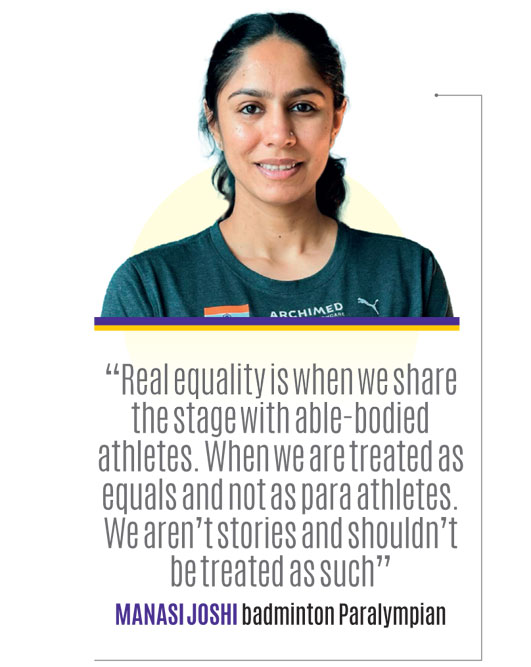
But the best came from Harmilan Bains, double medallist at the Hangzhou Asian Games. “Why is it that we only celebrate winners in India? Is sport only about winning medals? As I sit in this auditorium with some of the greatest sports stars India has ever produced, I am constantly asking myself if I would have been invited had I not won the two medals at the Asian Games. Why would you call an athlete who has no medal to show for?” she asked.
We organised the conclave to celebrate sport and not just medals. Every athlete who did not win in Hangzhou is also a winner and a champion of the future. We are as keen to know about their mental health and support them, document their stories and celebrate them in the very same way that we do a Neeraj or a Sreejesh.
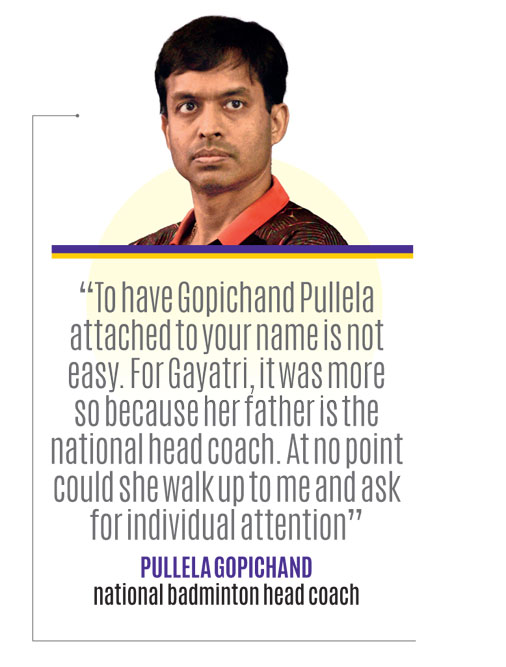
To return to Abhinav Bindra and his words of wisdom: “The most important lesson that sport teaches us is how to lose. It is not about how to win. In sports you will lose far more than you will ever win. In my career I have competed in some 1,780 competitions. At best I won 180 of them. Now that might sound quite a few but the truth is I had lost 1,600 competitions. And in the process learnt what sports is all about. I learnt from every loss and it got me closer to success. I improved with every loss and became a better human being as a result of it. I learnt the values that I stand for and far more than my Olympic gold medal, that’s what defines me. Not once am I saying that the medal is not important. Of course it is. It allowed me to have a voice. It made me who I am. It has given me a standing in the country. But that’s not what sports has taught me. It has taught me to stay in the present and be the best version of myself and that’s what I want to pass on to every aspiring sportsperson,” said Bindra.
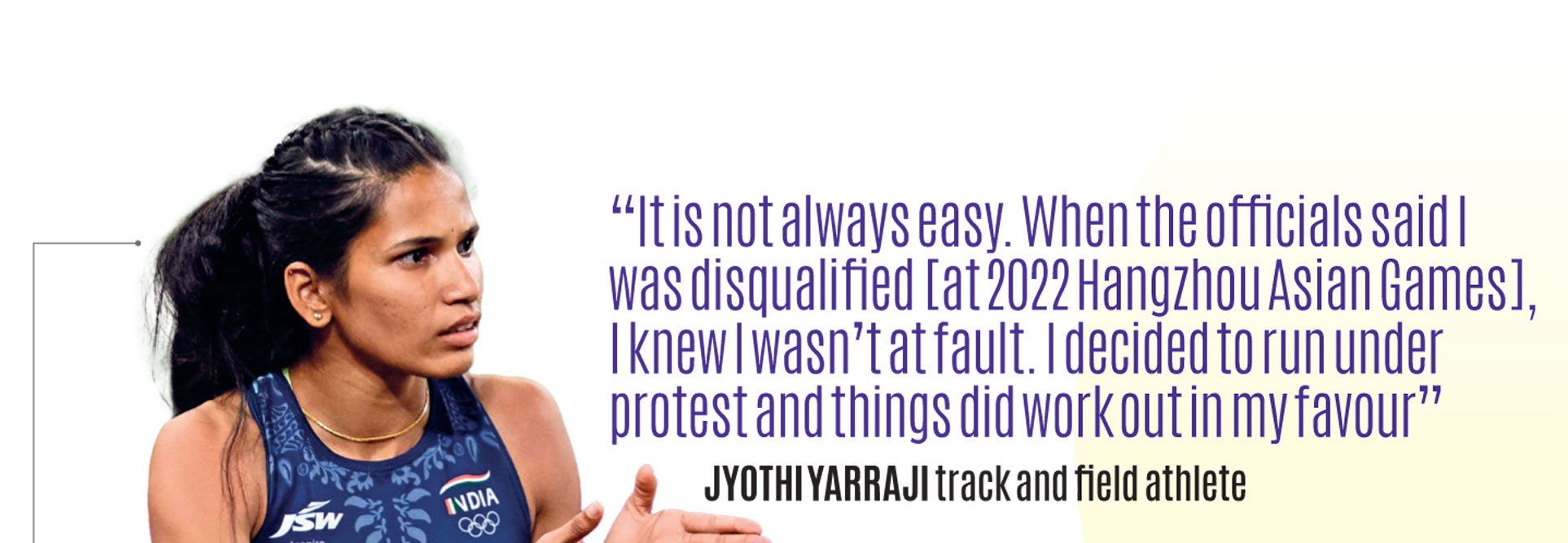
“It is not always easy,” recounted Jyothi Yarraji. “In front of a packed stadium of 80,000 Chinese people I felt alone when the officials said I was disqualified. I knew I wasn’t the one who was at fault. I knew I had to fight for my rights for that’s what I had been taught. So what if we were in China and so what if I was alone? Outside, Adille [Sumariwalla] Sir and Anju [Bobby George] Ma’am and others were all there for me. Inside the stadium I needed to stand up for my rights and for my country. I decided to run under protest and eventually things did work out in my favour,” recalled Yarraji.
To hear a 21-year-old recount her story of courage and resilience in front of sporting legends like Mary Kom and Anju Bobby George said a lot about the new-generation Indian athlete. Each one, be it Yarraji, Sift Samra, Esha Singh, Anush Agarwalla, Sumit Antil, or Yogesh Kathuniya, tries to be perfect on an imperfect day. They know that it is the decisive 1 per cent that drives them and it is this home stretch that will be their legacy. Having heard them all, I feel optimistic about our chances at Paris 2024, which promises to be a watershed in India’s sporting history.
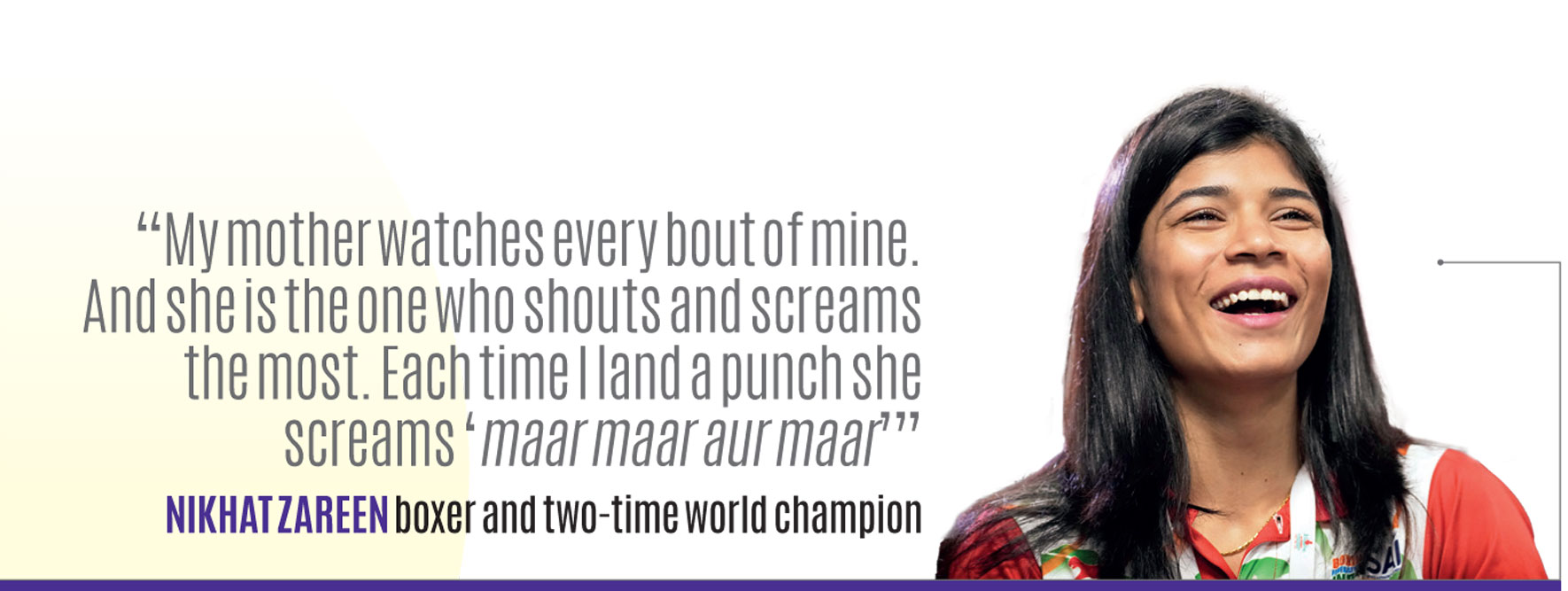
To conclude, here’s what Manasi Joshi said, “It is not easy to be a Paralympic athlete in India. More so, if you are a woman. For the longest time, people looked at you with sympathy. As if you are a loser and have little or nothing to look forward to. The truth is that we are all athletes. Yes, we have a certain disability but then 15 per cent of the world are men and women with disabilities. For an organisation to recognise that and make the conclave inclusive stood out for us. We weren’t just a footnote. Rather, all of us were real stories. Everyone wanted to listen to us and celebrate us. Treat us with respect and empathy. It is indeed a step forward.”

/wp-content/uploads/2025/06/Cover-OpenMinds2025.jpg)









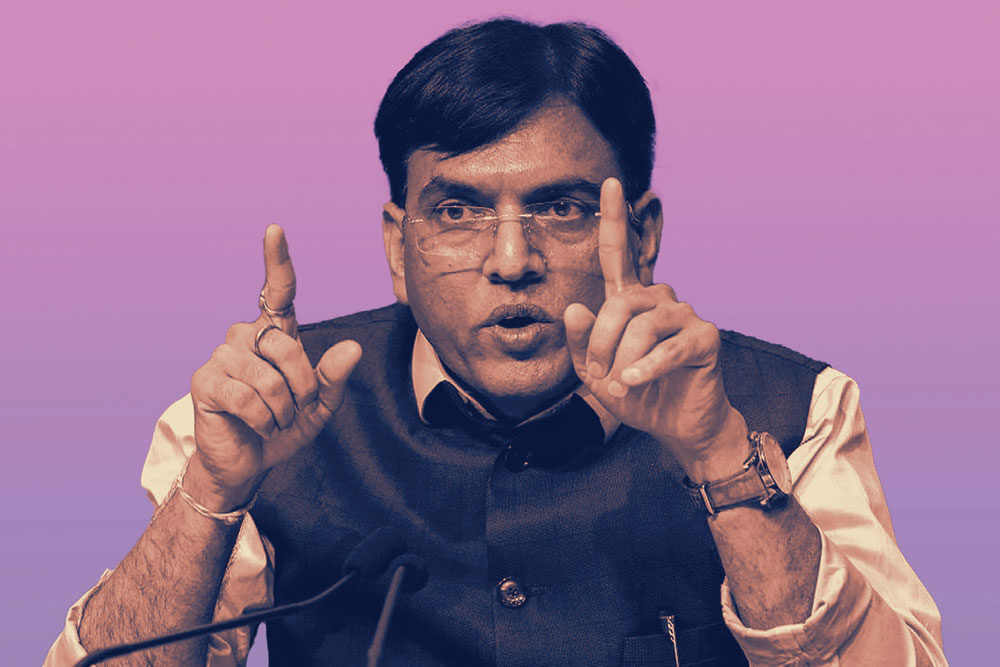


More Columns
'Gaza: Doctors Under Attack' lifts the veil on crimes against humanity Ullekh NP
Armed with ILO data, India will seek inclusion of social security in FTAs Rajeev Deshpande
Elon Musk Returns to Rebellion Mode Against Trump Open